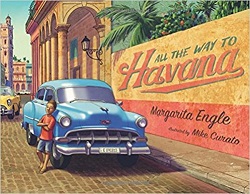
 All the Way to Havana
All the Way to HavanaReviewed August 31, 2017.
Godwin Books (Henry Holt and Company), 2017. 36 pages.
Starred Review
I fell for this book because of the wonderful, lilting use of language and onomatopoiea. The story is of a boy and his family going for a drive to Havana.
We have a gift, and we have a cake,
and today we're going to drive all the way
to the big city to see my new baby cousin
on his zero-year birthday!
But before they set out on their drive, they need to figure out why their old blue car isn't making its usual noises: "cara cara cara cara, cluck, cluck, cluck," but instead sounds like "pio pio, pio pio, pfffft."
Papá opens the trunk and lets me hand him
the heavy toolbox. Then he raises the hood
to show me all the rattling parts
that have been fixed with wire, tape,
and mixed-up scraps of dented metal.
The boy is involved in choosing tools and tinkering, twisting, and tightening - until "Cara Cara once again begins to sound like a chattering hen."
The drive into town involves giving rides to neighbors - and a new set of noises. There's a gorgeous and colorful spread as they come into town, driving on the curved road by the seawall, with many other old cars in all colors on the road along with them.
At the party, there fun and food with cousins, and then it's time to come home again.
So we zoom and bump all the way back
to our little village, where we will soon
have a chance to
cara cara
taka taka
pio pio
clunk
sleep.
I love the Author's Note at the back of the book. It adds depth to what is already such a lovely (for the eyes) and melodious (for the ears) story.
Due to a complex historical situation, many of the American cars on the island of Cuba are pre-1959 and so old that parts under the hood have been replaced many times, often with makeshift inventions. Despite more than half a century of poverty and hardship, the Cuban people remain so creative that they manage to keep machines of all sorts running long past the age when wealthier people would discard them. This simple poem about the island's noisy old cars is intended as an expression of admiration for the everyday ingenuity of poor people everywhere who have to struggle, persevere, create, and invent on a daily basis, never losing hope. Undoubtedly, a boy like the one in this story would dream of modern cars and space-age inventions along with plans to keep his family's antique car running smoothly.
